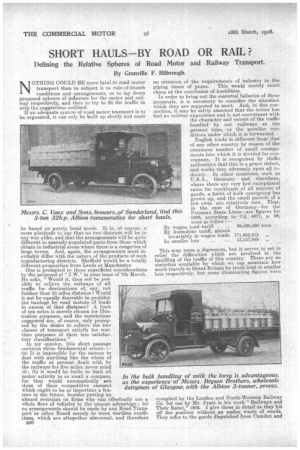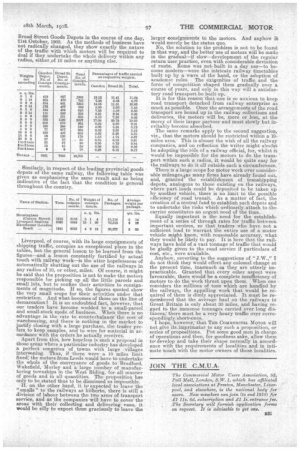SHORT HAULS BY ROAD OR RAIL ?
Page 8

Page 9

If you've noticed an error in this article please click here to report it so we can fix it.
Defining the Relative Spheres of Road Motor and Railway Transport.
By Granville F. Bilbrough.
NOTHING COULD BE more fatal to road motor transport than to subject it to rule-of-thumb conditions and arrangements, or to lay down proposed spheres of influence for the motor and railway respectively, and then to try to fit the traffic in with the suggestions outlined.
If an adequate system of road motor transport is to be organized, it can only be built up slowly arid must be based on purely local needs. It is, of course, a mere platitude to say that no two districts will be in any way alike, and that the arrangements will be quite different in sparsely-populated parts from those which obtain in industrial areas where there is a congeries of large towns. And, again, the arrangements must inevitably differ with the nature of the products of such manufacturing districts. Sheffield would be a totally different proposition from Leeds or Manchester. One is prompted to these superficial considerations by the proposal of " J.W." in your issue of 7th March. He asks, "Would it, then not be possible to relieve the railways of all traffic for destinations of, say, not further than 10 miles .distance2 Would it not be equally desirable to prohibit the haulage by road motors of loads in excess of that distance? A limit of ten miles is merely chosen for illustration purposes, and the restrictions suggested are, of course, only prompted by the desire to relieve the two classes of transport strictly for wartime purposes of their less satisfactory classifications."
In my opinion, this short passage contains three fundamental errors : (a) It is impossible for the naoters to deal with anything like the whole of the traffic at present dealt with by the railways for five miles, never mind 10; (b) it would be futile to limit all motor activity to so small a compass, for that would automatically yob them of their competitive element which ought to be so important a feature in the future, besides putting an absurd restraint on firms who can effectually use a Whole fleet of vehicles to the utmost advantage ; (c) no arrangements should be made by any Road Transport or other Board merely to meet wartime conditions, which are altogether abnormal, and therefore no criterion of the requirements of industry in the piping times of peace. This would merely court chaos at the conclusion of hostilities.
In order to bring out the essential fallacies of these proposals, it is necessary to consider the situation which they are supposed to meet. And, in this connection, it may be safely assumed that the writer has had no railway experience and is not conversant with the character and extent of the traffic handled by our railways at the present time, or the peculiar conditions under which it is forwarded.
English trade is different from that of any other country by reason of the enormous number of small consignments into which it is divided for conveyance. It is recognized by tiatfio. authorities that this is a grave defect, and works very adversely upon all industry. In other countries, such as U.S.A., Germany and elsewhere, where there are very low exceptional rates for truckloads of all manner of goods, a habit of bulk consigning has grown up, and the small parcels of a few cwts. are relatively rare. Thus,
In smaller lots ...
98,495,460 tons 171,655,213 „ 13,137,949 „ This may seem a digression, but it serves to set in relief the difficulties which are involved in the handling of the traffic of this country. There are no statistics available by which we can ascertain how much travels in Great Britain by truck load or smaller lots respectively, but some illuminating figures were
compiled by the London and North-Western Railway Co. for use by Mr. Pratt in his work "Railways and Their Rates," 1906. I giye these in detail as they hit off the position without an undue waste of words. They refer to the goods dispatched from Camden and Broad Street Goods Depots in the course of one day, 21st October, 1902. As the methods of business have not radically changed, they show exactly the nature of the traffic with which motors will be required to deal if they undertake the whole delivery within any radius, either,of 10 miles or anything else.
Similarly, in respect of the leading provincial goods depots of the same railway, the following table was given as emphasizing the same result and as being indicative of the fact that the condition is general throughout the country.
Liverpool, of course, with its large consignments of shipping traffic, occupies an exceptional place in the tables, but the general lesson to be learned from the figures-and a lesson constantly fortified by actual touch with railway work-is the utter hopelessness of automatically shutting out the use of the railways iii any radius of 10, or other, miles. Of course, it might be said that the proposition is not to make the motors responsible for picking up all the little parcels and small lots, butte confine their activities to consignments of magnitude. If so, the figures quoted_ show the very small scope for their activities under that restriction. And what becomes of those on the line of demarcation'? It is an undoubted fact, however, that our traders have become wedded to a, small-parcel and small-stock mode of business. When there is no advantage in the rate to counterbalance' the eost of warehousing, and there is nothing in the market to justify closing with a large purchase, the trader prefers to keep samples, and to wire for material in accordance with the Orders .he"actually receives.
Apart from this hoW hopeless is such a proposal in those areas where a particular industry has developed a, perfect congeries of towns with, large villages intervening. Thus, if there were a 10 miles limit fixed; the motors from ,Leeds would have tonndertake the whole of the conveyance of goods to Bradford, Wakefield,. Morley and a large number of manufaetiming townships in the West Riding, •for all manner of goods and in all quantities. The proposition has only to be_stated thus to be dismissed-as impossible. If on the other hand, it is' expected to leave the "smalls" to the railways as hitherto, there is still a division of labour between the two arms" of transport service, and as the companies *allhave f, cover the areas with their collecting and delivering vans, it would be silly to expect them graciously to leave the larger consignments to the motors. And anyhow it would merely be the status quo. No, the solution to the problem is not to be found in that way, and the better use of motors will be made in the gradual-if slow-development of the regular return user practice, even with considerable deviation of route. Rome was not built in a day nor-to become modern-were the intricate railway timetables built up by a wave of the hand, or the adoption of academic rules. The exigeriZies of traffic and the force of competition shaped them gradually over a course of years, and only in this way will a satisfactory road transport be built up.
It is for this reason that one is so anxious to keep road transport detached from railway enterprise as much as possible. Once the arrangements of the road transport are bound up in the railway collections and deliveries, the motors will be, more or less-, at the mercy of their larger partner and must slowly but inevitably become absorbed. •
The same remarks apply to the second suggestion, viz., that the motors should be restricted within a 10miles area. This is almost the wish of all the railway companies, and on reflection the writer might almtist be adopting the rile of a railway official, for, whilst it would be impossible for the motors to do the .trans' port within such a radius, it would be quite easy for the railways to do it all outside such a circumference. There is a large scope for motor work over consider. able mileages,ifts many firms have already found out, and, granted the establishment of transhipphig depots, analogous to those existing on the railways, w-here part loads could be deposited to be taken up by another vehicle, there is no limit to the possible efficiency of road transit. As a matter of fact, the creation of a central fund to establish such depots and to undertake the risks which ordinarily, attach to the carrier constitutes an urgent need of the time.
Equally important is the need for the establishment of a series of through rates for traffic between important centres, so that traders who have not a sufficient load to warrant the entire use of a motor vehicle might know, with reasonable accuracy, what they would be likely to pay. It is here that the railways have hold of a vast tonnage of traffic that would be gladly given. to the road service if particulars of cost, etc., were available.
Anyhow, reverting to the suggestions of " J.W.," I do not think they would effect any colossal change at the present time, inasmuch as they are utterly impracticable. Granted that every other aspect were favourable, there would be a complete insufficiency of motors to do the work thrust upon them. When one considers the millions of tons which are handled by the railways, the appalling work that would be required of them is dimly appreciated. It must be remembered that the average haul on the railways in Great Britain is only about 30 miles, and having regard to the immense tonnages carried over long disthices; there must be a very heavy traffic over correspondingly, short-ones. I hope, however, that THE COMMERCIAL MOTOR will not give its,finprim,atur to any such a proposition, or series of propositions. Put some good men in charge of cperations and then, for goodness sake, allow them to, develop and take their shape normally in accordance with the requirements of localities and in intimate touch with the motor owners of those localities.






















